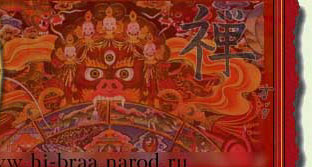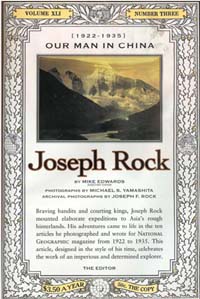 |
|||||
 |
 |
 |
 |
 |
 |
 |
 |
 |
|||
 |
 |
 |
|||
 |
 |
 |
 |
||
[ Увлечения / Тибет / Переводы статей "National Geographic" ]

- Япония: иероглифы, японская письменность, каллиграфия (мои работы), средневековые трактаты.
- Тибет, Непал: тибетская письменность, переводы статей журнала "National Geographic".
- Индия: санскрит, Веды.
- Буддизм: мандалы, тханка, мантры, ароматы.
Статьи:
"Our man in China" (перевод)
"Nepal's forgotten corner - Mustang"

|
|
"Our man in China"
Editor Mike Edwards.
Photographs Michael S. Yamashita.
Archive photos Joseph F. Rock.
WHEN HE SETTLED in Nguluko in 1922, at the age of 38, Rock called the village "charmingly situated, if not overclean." The situation was important; besides exploring for the GEOGRAPHIC, Rock would collect plant specimens, and the mountains close by burgeoned with varieties of rhododendrons and other plants that might grow well in the U.S. And the conifers, ferns, and other flora, if not of practical value, were of interest to scholars.
Under the GEOGRAPHIC's sponsorship 60,000 plant specimens reached the U.S., pressed between paper. They were turned over to the Smithsonian Institution in Washington, D.C., to be shared with universities and botanical institutions. He sent seeds to the Department of Agriculture packed in powdered charcoal to prevent them from drying out. (Some of his rhododendrons grow today in gardens in San Francisco and Seattle and in Great Britain.) He also sent 1,600 specimens of birds for American ornithologists to examine. Rock collected thousands of additional tree and shrub specimens with the financial support of Harvard's Arnold Arboretum.
People in Nguluko recall that Rock trained a Naxi cook to prepare Western-style meals. He was the only villager who ate with a knife and fork. And he usually ate alone.
A lifelong bachelor, Rock had many friends in Europe and America, but when he recounted his China experiences, "he never spoke of a buddy, someone to have a couple of shots with," remembers Paul Weissich, retired director of the Honolulu Botanical Gardens.
Weissich knew Rock in his last years and was executor of Rock's modest estate. "He was so oriented toward scholarship that I think he had little time for friendship."
Sometimes he took a missionary or another Westerner on his journeys. Once he took Edgar Snow, the American journalist who chronicled the rise of the Chinese communists in the 1930s and '40s. But, rigid and demanding, Rock inevitably found fault with his companions and parted company. He thought Snow naive and grumbled that one missionary was too full of "brotherly love and sweet words." That the intrepid explorer yearned for companionship is sadly clear from his diary, in which deep melancholia is mixed with his observations of plants and wildlife and the compass bearings of his travels.
"Today I have been frightfully lonely," he wrote while putting up at a Buddhist monastery. And on New Year's Eve 1937: "I am unspeakably lonely." Such was the flip side of what he once called his "romantic" travels.
Invariably, Rock recovered. "Where I live," he wrote contentedly to an editor during the Great Depression, "we know nothing of depressions. . . .nobody works for a living- that is, in an industrial capacity-hence there are no hard times."
| <<< | | 1 | 2 | 3 | 4 | 5 | | >>> |